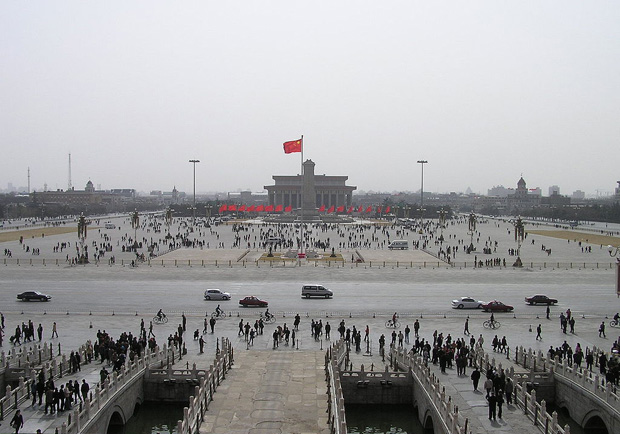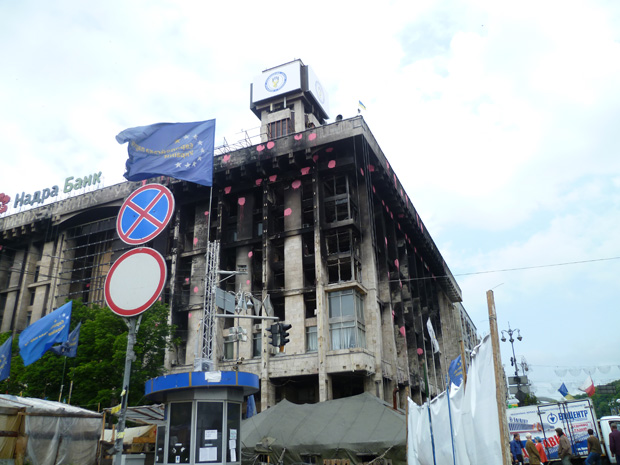23 May 2014 | Counter Terrorism, Digital Freedom, Guest Post, News and features
Censorship is central to the current debate on how to counter extremism online. With fears intensifying over the potential impact of returning foreign fighters and potential ‘lone wolf’ terrorists, governments are increasingly targeting the Internet as a source of radicalisation. However, using negative measures such as censorship only attack the symptom rather than the array of its causes. Findings from our recent Quilliam report show that censorship initiatives not only prove ineffective in tackling extremism, but are potentially counter-productive.
Governments still rely largely on negative measures (such as filtering, blocking and censoring) when tackling extremist content on the Internet. Yet censorship has never been the solution and nor will it be. The debate around what content is legal and illegal online, and how authorities should deal with it, is sensitive and has brought up a range of questions in the last ten years as the Internet has expanded, changing the way we communicate, educate and socialise.
Across Europe, filtering Internet traffic with a view to blocking access to unwanted content has generated discussions of free speech and the legality of censorship. While some filtering is currently nation-specific (France and Germany filter and block content that is related to Nazism or Holocaust denial), other filtering trends are EU-level initiatives (such as the filtering and attempted eradication of Child Sexual Abuse Imagery – CSAI). Although no one is likely to argue for the continuation of CSAI-related content, there is a much broader debate to be had around the subject of what to do with so-called ‘extremist content’.
British and French governments have set up online portals in recent years allowing the public to anonymously report potentially illegal websites and materials. The UK’s Counter Terrorism Internet Referral Unit (CTIRU), for example, runs an official portal allowing individuals to submit ‘online terrorist material’ which is subsequently reviewed and flagged to Internet Service Providers (ISPs). The CTIRU has, thus far, removed over 29,000 pieces of illegal terrorist propaganda in the last three years.
While this number might sound high to some, it pales in comparison to the amount of illegal content online, which continues to grow exponentially. Furthermore, it is more or less impossible to calculate the true quantity of content that might fall under specific guidelines of illegality, and it is even more difficult to try and quantify content that might be deemed ‘extremist’.
Even if this were a possible route for eliminating unwanted content, the fact of the matter is that the most potent forms of online extremism are not taking place on static websites or platforms (the principal platforms that filtering initiatives target). It shouldn’t come as a surprise that, following mainstream social trends, extremist organisations and their supporters are most effective and active on social media platforms, which are more difficult to target through filtering systems as well as being more temporal, so that once a conversation has been had, or a video shared, filtering does little to obstruct the message being disseminated.
Furthermore, the blocking or censoring of material is also ineffective in ensuring that the same unwanted content will not reappear. Websites can change domain names, content can be re-posted, and the discourse around a given subject can take place elsewhere. However, even if we could find a way to rid the web of unwanted content we deem as extremist, the question remains as to whether or not we should.
While government portals such as the CTIRU site provide an outlet for the public to alert officials about material they believe to be illegal, there is significant dispute over what can be deemed extremist and worthy of filtering. The adoption of an agreed definition of extremism continues to be deeply problematic.
Terrorism, and terrorist-related content, is grounded in a well-defined legal structure that is articulated through the UK’s Terrorism Acts, as well as those of other countries. As such, any material which promotes terrorism, encourages individuals to enact violence against others and/or supports a terrorist organisation is deemed illegal in the UK, whether on-, or offline. However, ‘extremist material’ is a much contentious subject matter, remaining, ultimately, in the realm of ideas. We should not look to expand the already broad definition of terrorism to include extremism, and must recognise that the two phenomena, though related, are distinct, and, as such, require distinct responses.
Governments should continue to target content that falls squarely within their legal guidelines, even if the negative measures imposed will never fully abolish illegal content. Engagement with, and access to, extremist online content also informs the work of counter-extremist organisations that can use this information to develop counter-speech. Online counter-extremism should be civil society-led as the internet is in the realm of self-regulation; we should contest this ungoverned space rather than attempt to censor it.
Some groups have already established online platforms to develop counter-speech and counter-extremist content; such platforms include websites like Islam against Extremism, Radical Middle Way and the YouTube channel set up by the Against Violence Extremism network. However, movements like these need far more support and constant updating. We need to encourage counter-extremism practitioners, community groups and local actors to contest online space and promote the same positive messages online as they do offline. This is already being done to an extent, by the likes of the US State Department’s Twitter account, @thinkagain_DOS, which directly challenges terrorist narratives online; Abdullah X, an online graphic novel that aims to make counter-extremism more fashionable than jihadism; the Google Ideas-run AVE Network, which acts as a resource to help us learn from the mistakes of former extremists; and finally, us at Quilliam, an organisation that works to hone the arguments with which to refute extremist ideologies, challenges their Manichean narratives and promotes pluralism within British Islam as an antidote to extremism.
These are just four ways that have been identified, but there are undoubtedly many more. Using such methods, we can effectively inhibit the capability of extremist narratives to monopolise online platforms which are, now more than ever, the defining spaces of public debate and expression.
This article was posted on May 23, 2014 at indexoncensorship.org
23 May 2014 | China, News and features

(Photo: Yo Hibino/Wikimedia Commons)
“Keep quiet and carry on” is the slogan that can best describe China’s take on the approaching 25th anniversary of the 1989 Tiananmen Square massacre.
This is the yearly Tiananmen anniversary crackdown, and people within China know what to expect; slower internet, blocked search terms, more military personnel in public and the arrest of high profile individuals. But this year’s crackdown appears particularly thorough, either a reaction to dissent being higher than usual or a perception that it is in light of the milestone anniversary.
The Chinese government has already jailed scores of lawyers, activists and intellectuals, sending a chilling message to any other would-be agitators. Of the most widely reported was the arrest of Pu Zhiqiang, a prominent human rights lawyer who helped organise the 1989 protests. His detention came three days after he joined a private panel discussion on the massacre. Around 15 people were at the event, five of whom have since been detained. Then there was the airing of confessions on state media by journalist Gao Yu and citizen journalist Xiang Nanfu this May, which echoes Maoist propaganda tactics.
As we get closer to 4 June actions against freedom of expression will grow. Yvonne Shen, who is Asia News Digest Editor at Freedom House, an NGO committed to tracking violations to free expression, says the Chinese government “step up their censorship efforts in the days surrounding that date”. Within a week the organisation anticipate spikes in suspicious activity online. They are keeping a close eye on social platform WeChat in particular, given its current popularity.
“There was a leaked document dated 31 May, 2011, from the Beijing Municipal Government, that suggested the authorities had launched a ‘wartime coordination mechanism’ that required all units to report suspicious information during the “sensitive period,” Shen tells Index of the government’s usual tactic.
China forbids open discussion of the Tiananmen Square crackdown, in which soldiers fired on crowds of unarmed pro-democracy protesters, killing hundreds if not thousands (no official death toll has ever been released). On top of arrests, an army of censors work overtime to ensure mentions of the event are quickly removed. Sites are blocked and words that allude to or directly reference it vanish.
The private realms of emails and direct messages are also monitored, as Louisa Lim, author of upcoming book The People’s Republic of Amnesia, Tiananmen Revisited, describes: “I wrote my book on a brand-new laptop that had never been online. Every night I locked it in a safe in my apartment. I never mentioned the book on the phone or in e-mail, at home or in the office — both located in the same Beijing diplomatic compound, which I assumed was bugged.”
Chinese journalists are trained “not to ever touch Tiananmen with a 10 foot pole,” Beijing-based journalist Eric Fish tells Index. He too perceives a recent shift: “The atmosphere for Chinese journalists has tightened quite a bit in general since Xi Jinping came to power. It feels like they’ve clamped down a lot more than normal in the lead-up to this anniversary.”
As Fish says, the detentions form part of a broader crackdown on free speech. When Xi Jinping came to power in 2012, there were hopes he would relax censorship. These hopes were quickly dashed. Index recently reported on a ban of seemingly innocent US TV shows, which shows just how pervasive the attack has been.
Even foreign journalists, who are usually granted more leeway, have experienced “a big uptick in pressure over the past two years,” says Fish, a reference to several prominent cases of journalist visas being revoked.
This is a fact Steven Levine has had to accept. “I anticipate being refused a Chinese visa the next time I apply to visit China as this is one way in which the Chinese authorities punish foreigners who criticise their human rights practices,” explains the retired professor of Chinese history and politics, who coordinates the Tiananmen Initiative Project — an individual effort aimed at focussing attention on the Tiananmen Movement and government crackdown.
Levine’s project has already been banned from the Chinese online world; within days of launching last November, the site had been blocked. Levine will not be deterred and continues to correspond with Chinese individuals inside the country, as well as with exiled Chinese who were either leaders or active in the 1989 movement. For him, being refused a visa is a price worth paying. It’s a different story for those inside of China, who take a much bigger gamble.
That said many have come up with creative ways to circumvent censorship. For example, prominent writer Murong Xuecun avoided the censors by using the politically neutral word “tractors” instead of the highly provocative “tanks”. And while “4th June” is blocked, the new code of “May 35th” has filled its place — a count of that month’s 31 days plus four in June.
It’s a game of cat and mouse. Ultimately, the cat is winning, but the mice aren’t going down without a fight.
This article was posted on May 23, 2014 at indexoncensorship.org
23 May 2014 | Europe and Central Asia, News and features, Ukraine

(Image: Index on Censorship)
Ukraine is seeing a “concerning pattern of grave violations of media freedom commitments” warns OSCE press freedom boss Dunja Mijatovic in a new report.
“As we know too well, in times of crisis and conflict, journalists and members of the media are among the first to be attacked, both physically and psychologically. Because those in power during periods of conflict demand complete control of all information free media is often their first target,” the report, published on Friday, states. Covering the time between 28 November 2013 and 23 May 2014, these are the three key findings.
1) Journalists face serious threats to their safety
There have been “nearly 300 reported cases of violence against journalists, including murder, physical assaults, kidnappings, threats, intimidations, detentions, imprisonments, and damage and confiscation of equipment”. These attacks are divided into two phases — the first covering the Maidan protests in Kiev, and the second the ongoing crisis in the east of the country. In Maidan, journalist Viacheslav Veremyi was killed, while almost 200 others were victims of violence. These include the over 40 journalists who were assaulted while covering protests on 13 December 2013. “In some cases,” the report states, “journalists were specifically targeted by law enforcement despite displaying clear identification as members of the press.” Since March, attacks on journalists in the east have intensified and gone without prosecution — something that “points to the breakdown of the rule of law in the parts of Ukraine affected by conflict”. On 18 May, Ukrainian military arrested two Russian journalists from LifeNews, while two journalists from Otkritiy Krymskiy Kanal were detained, interrogated, beaten and had their equipment seized by a group of people wearing military uniforms. Journalists in Crimea — recently annexed by Russia — who are not considered loyal to the region’s authorities, and who refuse to change citizenship, have been faced with regular threats, harassment and the possibility of eviction.
2) Ukraine is in the middle of an information war
There have been a number of accusations of the media being used to disseminate propaganda. “Propaganda and the deterioration of media freedom combine to fuel and contribute to the escalation of conflict, and once it starts they contribute to its escalation,” the report states. Among other thing, broadcasting stations “and related infrastructure” in Crimea, Sloviansk, Donetsk and Luhansk, have been attacked by unidentified and often armed individuals who supplanted regularly scheduled television programming with Russian state media. In March, the National Television and Radio Broadcasting Council of Ukraine ordered all cable operators to stop broadcasts of several Russian state TV channels. “No matter how loud and outrageous certain voices are, they will not prevail in a competitive and vibrant marketplace of ideas,” the report argues. “Therefore, any potentially problematic speech should be countered with arguments and more speech, rather than engaging in censorship.”
3) Media workers are being denied entry
In the past months, the OSCE has intervened in some 30 cases of journalists being denied entry into Ukraine and Crimea. “I have serious concerns about excessive restrictions on such travel, which ultimately affects the free flow of information and free media,” writes Mijatovic. Recently, Russia Today’s Arabic news crew, who travelled to Kiev to cover Sunday’s presidential election, were denied entry at immigration. Two crews from the All-Russia State Television and Radio Broadcasting Company (VGTRK) were not allowed to enter Ukraine, despite having all required accreditations. On a related note, a Rossiya-1 TV crew were this week deported from Ukraine.
This article was posted on May 23, 2014 at indexoncensorship.org
23 May 2014 | News and features, Pakistan, Politics and Society, Religion and Culture

(Image: Aleksandar Mijatovic/Shutterstock)
Shahidullah Afridi’s roots are in a village in the Bara administrative division of the Khyber agency. For the last four years, Afridi has been living in the neighbouring city of Peshawar, but keeps a keen eye on events at home.
He was shocked when he heard that last week, the outlawed militant group, Lashkar-e-Islam (LI) had started a rather strange recruitment drive in his village that asked residents to enrol at least one of their sons to madrassas run by LI or pay Rs 400,000 (£2,397.96) as penalty.
Afridi is glad he left when he could. “I have a five-year old son. I don’t want my son to study in a madressa. I didn’t and I consider myself a fairly good Muslim,” he said, adding: “If you don’t study in a school [as opposed to a madressa], you don’t find work.”
The news was confirmed by Zahir Shah Sherazi, Dawn TV’s bureau chief in Peshawar who also reports on FATA and KPK. “My sources tell me that A4 sized posters have been plastered all over the marketplace in the Malik Din Khel area, controlled by LI, demanding locals put their sons into the seminaries run by them,” he told Index, adding: “They also said admission in madrassas other than theirs would not be acceptable.”
Afridi has not visited his village since he left. “I neither sport a beard nor do I wear a skull cap,” he told Index by phone from Peshawar, where he works as a daily wage earner.
Ambreen Agha, a research assistant with New Delhi’s Institute for Conflict Management, said Mangal Bagh assumed the leadership of LI in 2007, emerging as a new face of extremism and Islamic fundamentalism. “He imposed his version of the Shariah, issuing diktats against women’s education, making it compulsory for men to keep beards and forced women to wear burqa.”
Neither the Pakistani government nor the army took any actions.
“It shows the incompetency of the establishment,” said Agha, adding: “Eight years of Bagh’s control of the area says enough about the will of the Pakistani state in dealing with the militants. ”
To Farahnaz Ispahani, public policy scholar with the Washington D.C. based-Woodrow Wilson Centre and a former parliamentarian, it’s a “reflection of the virtual end of pluralism and choice in Pakistan”.
“Extremist ideology has partnered with criminality; the so-called Lashkar-e-Islam is engaging in mafia-like extortion but seeking respectability as an Islamist insurgent group,” she told Index.
Sherazi terms Bagh a “criminal” adding that his is not an ideological fight. “He is just doing business — in drugs,” he said.
Journalist Taha Siddiqui, winner of this year’s Albert Londres Prize, has travelled extensively in the area controlled by Bagh as well as written about militancy. Siddiqui told Index: “Locals that I have spoken to tell me that the smuggling trade from Bagh’s area is most lucrative.”
But why has the state allowed Bagh to flex his muscles with such impunity?
Khyber agency is on the last leg of the NATO supply route before it enters Afghanistan. Siddiqui says it suits the Pakistani security establishment to keep the area lawless. “It helps to keep it infested with militants — and using the latter as proxies to keep the pressure on NATO when it’s exiting.”
In addition, he said, Pakistan had often hinted at acquiring the leftover military equipment. “What better way to have their way if the ISAF does not cooperate — keep attacking the supply route — and that is only possible if they have proxies there,” he explained.
At another level, Siddiqui said the state is using militancy to achieve some other objectives. “They created Ansar ul Islam [another banned militant group] to counter LI in Khyber agency. To me, it proves that they do not want to eradicate militancy, but keep arming one group to disarm the others, especially those who have turned against them.”
Bagh’s enrolment ultimatum is just another example of how emboldened the militant outfits have become and in comparison how weak the Pakistani state appears.
However, there is time still and if the state is sincere in protecting the next generation of children from embracing militancy, Siddiqui said, the civilian government should ask the military what it has been doing in Khyber agency for almost half a decade. “If it’s fighting militancy, then this should not be the result. On the other hand, if it is not, those responsible should be held accountable and heads should roll so that an effective counter-terrorism policy is actually implemented which is not limited to paying lip-service to gain international sympathy and aid through deceit and cheating that Pakistan has come to be known for.”
This article was posted on May 19, 2014 at indexoncensorship.org




